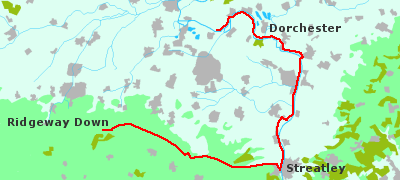Dawn broke, and a very dismal one it was too. The trees stood wet and bedraggled in the half-light, and the rain pattered down onto the taut canopy above my head. I was well concealed from passers-by, if indeed there were any on such a damp morning, so I stayed where I was, resting and munching biscuits. By half past seven the rain eased, and I packed and made my way out onto the Ridgeway once more. The sun was starting to burn through the wet clouds, and the air was warm and steaming. There was a tap by the side of the wood, and nobody about. I managed a makeshift shower, pouring bottles of water over myself. Then, clean and feeling fresh once more, I set off for the Thames.
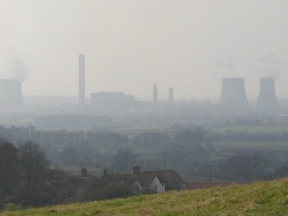
Away to my left I could make out the squat, ugly chimneys of Didcot power station, softened by the morning mist. I could not see that far, but I knew from the map that the river ran somewhere beyond them. The fold of the land where the Thames breaks through the chalk was still miles ahead. As I walked over the wet grass the clouds thinned and a watery sun came out. Rabbits scuttled away at my approach, wood pigeons scudded through the air; a huge hare loped along the horizon. A roebuck bounded vigorously towards a distant wood, stopping occasionally to look back and see if I was following.
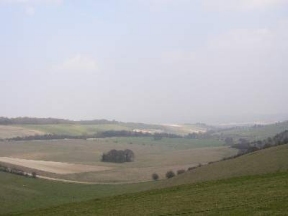
After an hour or so the path dived under the Newbury-Oxford road and emerged into more broken country. It bent away from the ridge, aiming for the ford at Streatley. In the tangle of tracks I briefly lost my way, but I was soon on course once more. I climbed to the top of the last slope and began the long descent to the river. To my right the ground fell away into a deep valley. High overhead, buzzards soared in the blue sky. Lambs revelled in the sunshine. Butterflies drifted through the grass, bright as peacocks. One last long level and I came to the Bull at Streatley, in time for lunch.
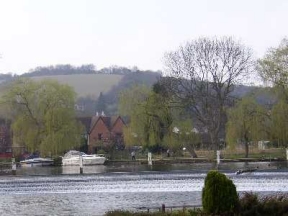
That afternoon I admit I cheated. I remembered from a previous walk that part of the Thames Valley Path from Wallingford to Dorchester is on main roads (it is, though not as much as I thought). So I took the bus as far as Dorchester and began walking again down by Day's lock. The path crosses the river on a series of narrow footbridges and sets off through the water meadows. For a couple of miles it hugs the right bank, tracing a long bend of the languid, flowing stream. Out on the water that day great rafts of geese drifted. Hundreds more were grazing the wide fields. They honked angrily if I ventured too close, and I picked a careful path through the querulous colonies ashore.
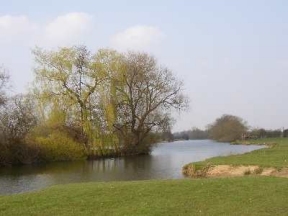
At length I left them behind and came to the "Barley Mow". It was mentioned in "Three Men in a Boat", Jerome's account of a jaunt up the Thames in Victorian times, as a quaint, crooked old inn; it has been improved since then, and is now a rather fancy eating establishment (there is a sign outside saying "Sorry, no muddy boots"). In spite of this it still manages to retain a certain charm. Although they have probably moved on by now, I should mention that the staff who were there when I turned up were a cheerful, friendly bunch. They certainly brightened up my day. And it was in need of brightening.

I examined the sky as I emerged from the inn. I did not like the look of it one bit. A sudden storm was brewing, and the clouds were dark and disquieting. Shelter was necessary - and fast. I had passed a patch of ground, a quarter of a mile back, where I might have camped at a pinch, but I was unwilling to retrace my steps. So I decided to push on in the hope of finding somewhere better. Not surprisingly, things being what they are, for the next two miles there was not a single suitable site. The path, which had been running through open meadows, entered a muddy corridor pinched by the stream and a tangle of barbed wire. Not even space to lie down, let alone put up a bivouac. I anxiously inspected the fields as I hurried along, but those uninhabited by cows were denuded of trees, or thistle-strewn. All the time I was aware of the storm pursuing me. Lightening tore open the sky. The roar of thunder hunted over the river. At last the path broadened, and I scrambled up a low bank onto a narrow terrace backed by a hedge. There I hastily tied one end of my shelter to a branch, propping up the other with a rotten stick. The pegs I drove deep into the soft ground, praying that there would not be any wind. It would not have taken much to have collapsed the whole flimsy structure. Finally I dragged myself and my luggage onto the groundsheet spread out inside, as the first heavy drops of rain came down.

